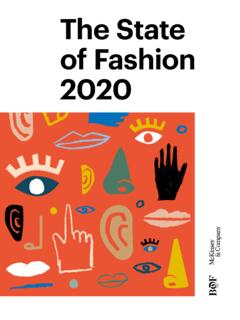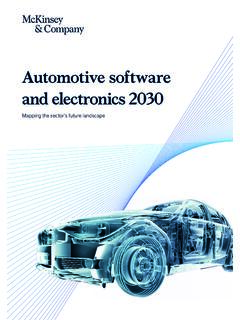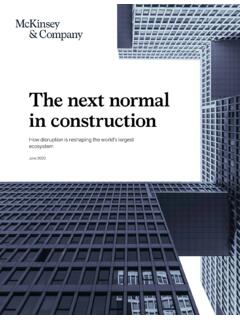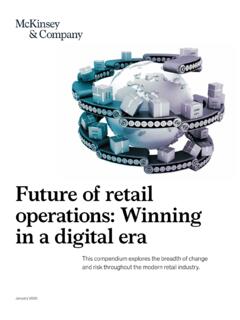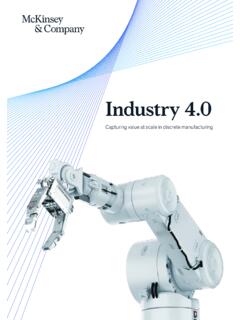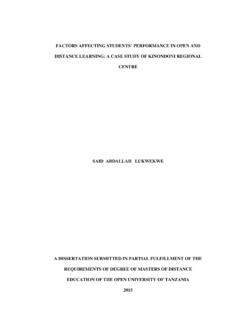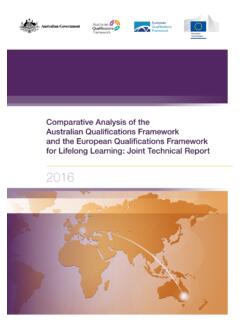Transcription of SKILL SHIFT AUTOMATION AND THE FUTURE OF THE …
1 Jacques Bughin | Brussels Eric Hazan | Paris Susan Lund | Washington, DC Peter Dahlstr m | London Anna Wiesinger | Dusseldorf Amresh Subramaniam | London DISCUSSION PAPERMAY 2018 SKILL SHIFT AUTOMATION AND THE FUTURE OF THE WORKFORCE Copyright McKinsey & Company 2018 Since its founding in 1990, the McKinsey Global Institute (MGI) has sought to develop a deeper understanding of the evolving global economy. As the business and economics research arm of McKinsey & Company, MGI aims to provide leaders in the commercial, public, and social sectors with the facts and insights on which to base management and policy decisions.
2 MGI research combines the disciplines of economics and management, employing the analytical tools of economics with the insights of business leaders. Our micro-to-macro methodology examines microeconomic industry trends to better understand the broad macroeconomic forces affecting business strategy and public policy. MGI s in-depth reports have covered more than 20 countries and 30 industries. Current research focuses on six themes: productivity and growth, natural resources, labor markets, the evolution of global financial markets, the economic impact of technology and innovation, and urbanization.
3 Recent reports have assessed the digital economy, the impact of AI and AUTOMATION on employment, income inequality, the productivity puzzle, the economic benefits of tackling gender inequality, a new era of global competition, Chinese innovation, and digital and financial is led by three McKinsey & Company senior partners: Jacques Bughin, Jonathan Woetzel, and James Manyika, who also serves as the chairman of MGI. Michael Chui, Susan Lund, Anu Madgavkar, Jan Mischke, Sree Ramaswamy, and Jaana Remes are MGI partners, and Mekala Krishnan and Jeongmin Seong are MGI senior fellows.
4 Project teams are led by the MGI partners and a group of senior fellows, and include consultants from McKinsey offices around the world. These teams draw on McKinsey s global network of partners and industry and management experts. Advice and input to MGI research are provided by the MGI Council, members of which are also involved in MGI s research. MGI Council members are drawn from around the world and from various sectors and include Andr s Cadena, Sandrine Devillard, Richard Dobbs, Tarek Elmasry, Katy George, Rajat Gupta, Eric Hazan, Eric Labaye, Acha Leke, Scott Nyquist, Gary Pinkus, Sven Smit, Oliver Tonby, and Eckart Windhagen.
5 In addition, leading economists, including Nobel laureates, act as research advisers to MGI partners of McKinsey fund MGI s research; it is not commissioned by any business, government, or other institution. For further information about MGI and to download reports, please visit CONTENTSIn brief1. How will demand for workforce skills change with AUTOMATION ? Page 12. Shifting SKILL requirements in five sectors Page 203. How will organizations adapt? Page 364. Building the workforce of the FUTURE Page 49 Technical appendix Page 69 Acknowledgments Page 75 IN BRIEF SKILL SHIFT : AUTOMATION AND THE FUTURE OF THE WORKFORCE AUTOMATION and artificial intelligence (AI) are changing the nature of work.
6 In this discussion paper, part of our ongoing research on the impact of technology on the economy, business, and society, we present new findings on the coming shifts in demand for workforce skills and how work is organized within companies, as people increasingly interact with machines in the workplace. We quantify time spent on 25 core workplace skills today and in the FUTURE for the united States and five European countries, with a particular focus on five sectors: banking and insurance, energy and mining, healthcare, manufacturing, and retail.
7 Key findings : AUTOMATION will accelerate the SHIFT in required workforce skills we have seen over the past 15 years. Our research finds that the strongest growth in demand will be for technological skills, the smallest category today, which will rise by 55 percent and by 2030 will represent 17 percent of hours worked, up from 11 percent in 2016. This surge will affect demand for basic digital skills as well as advanced technological skills such as programming. Demand for social and emotional skills such as leadership and managing others will rise by 24 percent, to 22 percent of hours worked.
8 Demand for higher cognitive skills will grow moderately overall, but will rise sharply for some of these skills, especially creativity. Some SKILL categories will be less in demand. Basic cognitive skills, which include basic data input and processing, will decline by 15 percent, falling to 14 percent of hours worked from 18 percent. Demand for physical and manual skills, which include general equipment operation, will also drop, by 14 percent, but will remain the largest category of workforce skills in 2030 in many countries, accounting for 25 percent of the total hours worked.
9 SKILL shifts will play out differently across sectors. Healthcare, for example, will see a rising need for physical skills, even as demand for them declines in manufacturing and other sectors. Companies will need to make significant organizational changes at the same time as addressing these SKILL shifts to stay competitive. A survey of more than 3,000 business leaders in seven countries highlights a new emphasis on continuous learning for workers and a SHIFT to more cross-functional and team-based work. As tasks change, jobs will need to be redefined and companies say they will need to become more agile.
10 Independent work will likely grow. Leadership and human resources will also need to adapt: almost 20 percent of companies say their executive team lacks sufficient knowledge to lead adoption of AUTOMATION and artificial intelligence. Almost one in three firms are concerned that lacking the skills they need for AUTOMATION adoption will hurt their FUTURE financial performance. Competition for high- SKILL workers will increase, while displacement will be concentrated mainly on low- SKILL workers, continuing a trend that has exacerbated income inequality and reduced middle-wage jobs.
